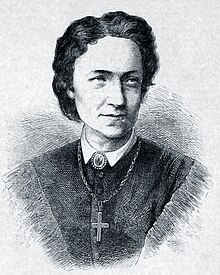
Back أديل سبيتزيدر Arabic اديل سبيتزر ARZ Adele Spitzeder German Adele Spitzeder Spanish Adele Spitzeder Finnish Adele Spitzeder French Спитцедер, Адель Russian
Adele Spitzeder | |
|---|---|
 Drawing of Spitzeder from the 1873 magazine Die Gartenlaube, based on a photograph | |
| Born | Adelheid Luise Spitzeder 9 February 1832 |
| Died | 27 or 28 October 1895 (aged 63) |
| Resting place | Alter Südfriedhof, Munich 48°07′39″N 11°33′51″E / 48.1275°N 11.5643°E |
| Other names | Adele Vio |
| Occupation(s) | Singer, actress, private banker |
| Years active | 1856–1895 |
| Known for | Introducing the first Ponzi scheme |
Adelheid Luise "Adele" Spitzeder ([ˈaːdl̩haɪt ʔaˈdeːlə ˈʃpɪtˌtseːdɐ]; 9 February 1832 – 27 or 28 October 1895), also known by her stage name Adele Vio, was a German actress, folk singer, and con artist. Initially a promising young actress, Spitzeder became a well-known private banker in 19th-century Munich when her theatrical success dwindled. Running what was possibly the first recorded Ponzi scheme, she offered large returns on investments by continually using the money of new investors to pay back the previous ones. At the height of her success, contemporary sources considered her the wealthiest woman in Bavaria.
Opening her bank in 1869, Spitzeder managed to fend off attempts to discredit her for a few years before authorities were able to bring her to trial in 1872. Because Ponzi schemes were not yet illegal, she was convicted instead of bad accounting and mishandling customers' money and sentenced to three years in prison. Her bank was closed and 32,000 people lost 38 million gulden, the equivalent of almost 400 million euros in 2017 money, causing a wave of suicides. Her personal fortune in art and cash was stripped from her.
After her release from prison in 1876, Spitzeder lived off benefactors and unsuccessfully tried to act again in Altona and Berlin. She left Germany for Vienna but police there prevented her engagement, so she returned to Munich in 1878 to publish her memoir. She was arrested again in 1880 for attempting to open a new bank without having the necessary permits but later released without charges. Spitzeder performed as a folk singer, living off friends and benefactors, but she never left her criminal life completely behind her, resulting in further trials and periods of incarceration. She died of cardiac arrest on 27 or 28 October 1895 in Munich.
Spitzeder never married, but it was noted that she carried on several lesbian relationships. Outwardly, she maintained the persona of a pious Christian woman who helped the poor, which aided the success of her business.
© MMXXIII Rich X Search. We shall prevail. All rights reserved. Rich X Search